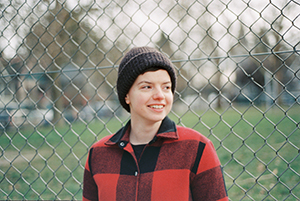Fighting with Social Conventions:
Sam Bollinger in Conversation with Kayla Czaga

Volunteer Sam Bollinger talks with Kayla Czaga, whose poems "Safe Despair," "Static," and "Self-Portrait with Pizza Pop" appear in our spring issue #222. They discuss themes that surface subconsciously, advice to share with your past self, and the necessity of humour when writing about dark topics.
Kayla Czaga is the author of three collections of poetry: For Your Safety Please Hold On (Nightwood Editions, 2014), which won The Gerald Lampert Memorial Award and was nominated for the Governor General’s Award for poetry; Dunk Tank, which was nominated for the BC & Yukon Book Prizes’ Dorothy Livesay Poetry Prize; and Midway, forthcoming from House of Anansi in 2024. Recent writing has appeared in The Fiddlehead, CV2, Room Magazine, and Best Canadian Poetry in English 2024. She is the online poetry mentor for SFU’s The Writer’s Studio.
[photo credit: Erin Flegg]
All three of your poems discuss the pressures of girlhood that arise when growth meets the confines of social conventions. How do you navigate this tension in your work?
That’s funny—I didn’t draw that connection between the poems. To me, all three felt very different formally and thematically, which is why this question is really difficult to answer. It appears that I write about girlhood and fighting with social conventions even when I don’t think I am. They’re big themes for me because they’re things I struggle with. They come out even when I’m trying to write about something else.
“Safe Despair” opens with a subversion of Emily Dickinson’s notable lines, “Because I could not stop for Death— / He kindly stopped for me.” What inspired you to choose Emily Dickinson as the subject of your poem and how do you bring her into the modern era?
I actually didn’t choose the poem because of Emily Dickinson, but because of Death, who I’d been writing about for a couple of years. Dickinson’s poem made me think about his character—Death drives, is revered—in a new way. There seemed to be a power imbalance between Death and Dickinson’s speaker, who “could not,” which I found really compelling. I decided to recast Dickinson’s speaker as an angsty teenage girl with Death as her much older shitty boyfriend. Dickinson got lost in the portrayal and in what I wanted to talk about. She grew to resemble one of my typical speakers. My spotlight was really on Death.
You weave together pop-culture references and vivid description with a voice that is both dark and comedic. Can you speak to the importance of humour in your work, and how you use it to approach difficult topics?
After my father died, my mother and I were cleaning his things out of the bathroom and we found his hairbrush. It was disgusting, matted from years of use in his long white hair. She handed it to me and said, “Here, grow yourself a new dad.” Her comment broke down the tension of our activity, let some oxygen into the bathroom. We both laughed. I guess I inherited this trait, of being funny around dark topics. For me, it’s necessary and comes quite naturally. I need to let the air in, so the dark things don’t become too much, but also as a contrast—dark things seem darker in proximity to humour.
Why are you drawn to the poetic form? What keeps you inspired and excited to write?
I often like to say that poetry chose me. It wasn’t something I consciously thought about getting into, but just something I started doing one day around age eleven. As to why I’m still doing it: I love the way anything can be a poem. A poem can be hundreds of pages or two words long. It doesn’t have to contain any words at all. There’s really no end to the things you can do with poetry, so it never gets boring.
Time is not linear in “Self Portrait with Pizza Pop,” and the speaker’s past, present, and future selves exist in the poem simultaneously. If you could, what advice would you share with the Kayla who was just beginning to write and send out work?
I recently found a journal I’d kept from around this time—2012/2013. In a lot of entries, I was really mad at how little I was writing. I never felt like I was writing enough, but at the time, I was actively (and quite quickly) writing my first collection. The funny thing is that I still journal about how little I’m writing, how it never feels like enough. I’d like to tell both of these Kaylas that they are probably writing enough. I’d like if they believed me, but it’s unlikely they will. I’d also like to encourage 2012 Kayla to take the time to develop organizational systems that work for her and to let her know that writing comes with more administrative work than she’d like it to—really, a lot of paperwork. Also that she should trust how she feels about things more often.
Can you share any writing projects you are currently working on? What are you reading right now and what’s on your to-read list?
I’m just finishing up edits on my third poetry collection, Midway, which is coming out next spring with House of Anansi. I’m reading Nobody Gets Out Alive by Leigh Newman (a great collection of stories about women and Alaska). There are so many poetry collections out this year I’m really excited about: Brandi Bird, Jake Byrne and A. Light Zachary’s (long-awaited) debuts; plus sophomore collections by Catriona Wright, Michelle Brown, and T. Liem. It’s looking to be a really incredible year for Canadian poetry.

Sam Bollinger
* * * * * * * *









